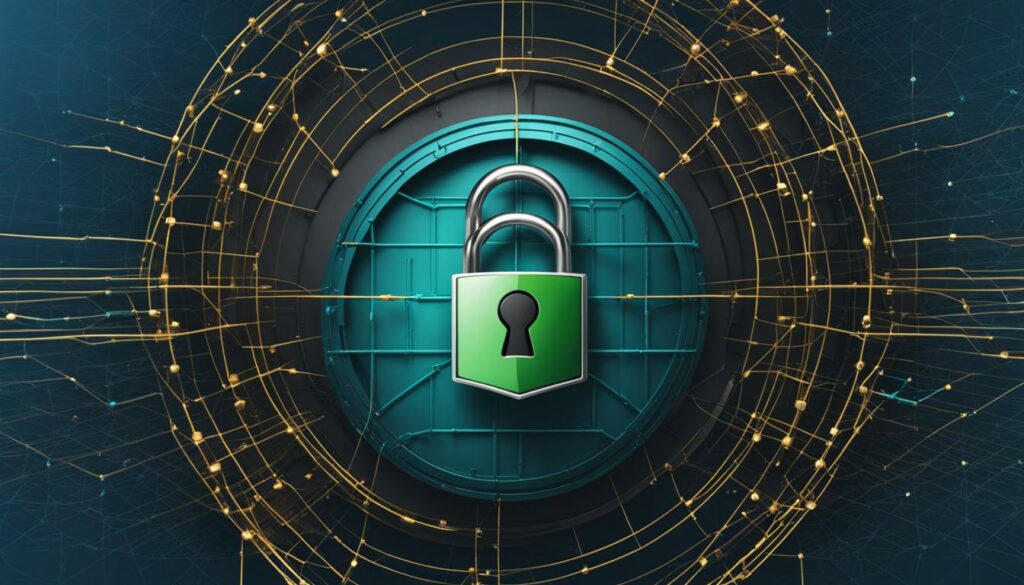VPNs have become increasingly popular for enhancing internet security and privacy. They provide a way to protect personal data and access restricted content by routing internet traffic through a secure server. In this guide, we will explore the concept of VPNs and provide a diagrammatic explanation of how they work.
Key Takeaways:
- A VPN, or virtual private network, is a service that masks a user’s IP address and encrypts their internet traffic.
- VPNs were developed in the 1990s to address the need for secure and private connections on the internet.
- VPNs have various uses, including enhancing security, protecting privacy, and accessing restricted content.
- The legality of VPN usage varies from country to country, so it’s important to check the laws in your specific location.
- There are different types of VPNs, such as client-based VPNs, SSL VPNs, and site-to-site VPNs.
What Is a VPN?
A VPN, or virtual private network, is a service that masks a user’s IP address and encrypts their internet traffic. By doing so, it allows users to browse the internet anonymously and securely. The term “virtual” refers to the fact that VPNs are a digital service, while “private” indicates the encryption and protection of the user’s connection. VPNs create a secure network between the user’s device, the VPN server, and the internet.
By using a VPN, users can enjoy several benefits. Firstly, it protects their privacy by masking their IP addresses and encrypting their internet traffic, making it difficult for anyone to track their online activities. Secondly, VPNs provide a secure connection, especially when using public Wi-Fi networks, which are often vulnerable to hackers. Additionally, VPNs allow users to bypass geographic restrictions and access content that may be blocked in their region.
When using a VPN, the user’s device establishes a connection to a VPN server, which acts as an intermediary between the user and the internet. This connection creates a secure tunnel through which all data is transmitted. The data is encrypted by the user’s device and decrypted by the VPN server, ensuring that it remains secure throughout the process. This encryption and decryption process prevents anyone from intercepting or accessing the user’s data.
| Benefits of a VPN | How a VPN Works |
|---|---|
|
|
Using a VPN allows users to browse the internet anonymously and securely, while also bypassing geographic restrictions and protecting their privacy. By establishing a secure connection between the user’s device and a VPN server, all data transmitted is encrypted, ensuring that it remains private and secure. VPNs have become an essential tool for those seeking to enhance their online security and privacy.
Types of VPNs
There are different types of VPNs that cater to various needs and requirements. Client-based VPNs are the most common type and are suitable for individual users who want to create a private network connection. SSL VPNs, on the other hand, are often used by organizations to provide remote access to their networks for employees. Site-to-site VPNs connect multiple networks within large organizations, allowing them to securely share resources.
Each type of VPN has its own advantages and features. Whether you need a VPN for personal use or for your organization, understanding the different types available can help you make an informed decision and choose the one that best suits your needs.
Brief History of VPNs
Virtual Private Networks (VPNs) have a rich history dating back to the early 1990s. The need for secure and private connections on the internet became apparent with the rise of the Advanced Research Projects Agency Network (ARPANET) and the increasing concerns about online security. As a response to these challenges, the first VPN protocols were developed, laying the foundation for the VPN technology we know today.
The development of VPNs can be attributed to pioneers in the field, such as Gurdeep Singh-Pall, who created the initial concept of secure tunnels for data transmission. In the early 1990s, protocols like swIPe and IPSec were introduced to provide secure communication channels over public networks.
Since their inception, VPNs have evolved significantly to meet the growing demands for privacy and security. Today, VPN usage has become widespread, with individuals, businesses, and organizations relying on VPNs to safeguard their online activities and protect sensitive data from prying eyes.
To get a better understanding of the evolution of VPNs, let’s take a look at the table below, which highlights the major milestones in their development:
| Year | Development |
|---|---|
| 1990s | Introduction of the first VPN protocols: swIPe and IPSec |
| 2000s | Advancements in VPN technology, including the introduction of SSL VPNs |
| 2010s | Increased adoption of VPNs for personal and business use, improved encryption methods |
| 2020s | Rapid growth in VPN usage due to privacy concerns and remote work needs |
As VPNs continue to evolve, it is important to stay informed about the latest developments in the field to make informed decisions about privacy and security.
VPN Uses
VPNs have become increasingly popular due to their wide range of uses and benefits. Whether you are concerned about online privacy, security, or accessing content from around the world, a VPN can provide the solution you need. Here are some of the key benefits and reasons why people use VPNs:
1. Enhanced Security:
One of the primary reasons people use VPNs is to enhance their online security. By encrypting your internet traffic and masking your IP address, a VPN adds an extra layer of protection against hackers and cybercriminals. It ensures that your sensitive information, such as passwords and financial details, remains secure and private.
2. Anonymity and Privacy:
A VPN allows you to browse the internet anonymously and maintain your privacy. By changing your virtual location and IP address, a VPN makes it difficult for websites, advertisers, and even your internet service provider (ISP) to track your online activities. It prevents targeted ads, reduces the risk of online profiling, and safeguards your personal information.
3. Access to Geo-Restricted Content:
With a VPN, you can bypass geo-restrictions and access content that may be blocked in your region. By connecting to a VPN server in a different country, you can access streaming services, websites, and online platforms that are restricted to specific regions. This allows you to enjoy your favorite shows, movies, and online content from anywhere in the world.
4. Secure Remote Working:
A VPN is essential for remote workers who need to access their company’s network securely. It creates a secure connection between the user’s device and the company’s network, protecting sensitive data and ensuring secure communication. VPNs are widely used by businesses to enable remote workers to access and work on company resources without compromising security.
These are just a few examples of how VPNs can be beneficial and why people choose to use them. Whether it’s for online security, privacy, accessing restricted content, or remote working, a VPN is a valuable tool that offers peace of mind and a more secure internet experience.

Is It Illegal to Use a VPN?
When it comes to the legality of using a VPN, the situation varies from country to country. In most countries, VPN usage is completely legal and widely accepted as a tool for enhancing online privacy and security. However, there are some countries where restrictions or even outright bans on VPN usage exist.
For example, in China and Russia, the use of VPNs is heavily regulated. The Chinese government has implemented strict controls over VPN services, requiring providers to obtain special licenses and adhere to government guidelines. Similarly, Russia has taken steps to restrict VPN usage, with laws in place that require VPN providers to restrict access to websites that are blocked by the government.
To ensure compliance with the laws and regulations regarding VPN usage, it is important to do thorough research and understand the legal landscape in your specific country. While VPNs offer numerous benefits, it is essential to use them responsibly and in accordance with the laws of your jurisdiction.
| Country | Legality of VPN Usage |
|---|---|
| United States | Legal |
| United Kingdom | Legal |
| Canada | Legal |
| China | Restricted/Legal with government-approved VPNs |
| Russia | Restricted/Legal with government-approved VPNs |
As the table above illustrates, the legality of VPN usage can vary considerably. It is essential to stay informed about the current legal landscape to ensure that you are using a VPN in compliance with the laws of your country.
Types of VPNs
When it comes to VPNs, there are several different types that offer varying levels of security and functionality. Understanding the different types can help you choose the right VPN for your specific needs. Below, we will explore the most common variations of VPNs:
1. Client-based VPNs
Client-based VPNs are the most popular type of VPN and are designed for individual users. These VPNs usually involve the installation of software or browser extensions on your device. Once installed, you can connect to a remote server, which will then encrypt your internet traffic and mask your IP address. This type of VPN is widely used for personal privacy and security.
2. SSL VPNs
SSL VPNs, also known as Secure Socket Layer VPNs, are commonly used by organizations as a way to provide remote access to their networks for employees. These VPNs utilize SSL encryption, the same encryption technology used by websites to secure online transactions. SSL VPNs are known for their ease of use and compatibility with various devices and operating systems.
3. Site-to-site VPNs
Site-to-site VPNs are often used by large organizations with multiple locations. These VPNs connect multiple networks, allowing them to securely share resources and communicate with each other over the internet. Site-to-site VPNs are typically more complex to set up and require specialized hardware or software. They provide a high level of security and are ideal for businesses that need to transfer sensitive data between locations.
Each type of VPN has its own advantages and considerations, so it’s important to evaluate your specific needs before choosing a VPN. Whether you’re looking for personal privacy or secure access to company resources, there is a VPN type that can meet your requirements.
How Does a VPN Work?
A VPN, or virtual private network, works by creating a secure and encrypted connection between a user’s device and the internet. It ensures that all internet traffic is securely transmitted and prevents third parties from accessing or intercepting the data. The working mechanism of a VPN involves several steps that ensure privacy and data security.
The VPN Working Mechanism
- User connects to a VPN server: When a user wants to establish a VPN connection, they first connect to a VPN server. This server acts as an intermediary between the user’s device and the internet.
- Encryption of data: Once connected to the VPN server, the user’s data is encrypted. This means that the data is converted into a secure and unreadable format to prevent unauthorized access.
- Transmission of encrypted data: The encrypted data is then transmitted through a secure tunnel. This tunnel serves as a protected path between the user’s device and the VPN server.
- Decryption of data: Upon reaching the VPN server, the encrypted data is decrypted. This allows the VPN server to view the contents of the data and send it to its intended destination on the internet.
By following this process, a VPN ensures that all data transmitted between the user’s device and the internet is protected and cannot be easily intercepted or accessed by hackers, ISPs, or other entities.
Additionally, VPNs use different encryption protocols to secure the data. Some commonly used protocols include OpenVPN, IPSec, and SSL/TLS. These protocols employ different encryption algorithms and key exchange methods to enhance data security. The choice of protocol depends on factors such as security requirements, compatibility, and speed.
| VPN Working Mechanism | Benefits |
|---|---|
| User connects to a VPN server | – Ensures privacy and anonymity |
| Encryption of data | – Protects against data interception and unauthorized access |
| Transmission of encrypted data | – Secures data transmission over public networks |
| Decryption of data | – Allows access to the intended destination on the internet |
Overall, the working mechanism of a VPN involves establishing a secure connection, encrypting data, and transmitting it through a protected tunnel. This ensures privacy, data security, and the ability to browse the internet anonymously.

What Does a VPN Do?
A VPN, or virtual private network, offers numerous benefits and advantages to its users. By encrypting internet traffic and masking the user’s IP address, a VPN provides enhanced privacy, security, and accessibility. Here are some key features and benefits of using a VPN:
- Conceals Internet Activity: A VPN hides your online activity from your internet service provider (ISP) and other prying eyes, ensuring your browsing history remains confidential.
- Protects Against Tracking and Targeted Ads: With a VPN, your online activities become anonymous, preventing advertisers from tracking your online behavior and bombarding you with targeted ads.
- Bypasses Content Restrictions: VPNs allow you to access geo-restricted websites and content by masking your IP address and making it appear as if you are browsing from a different location.
- Ensures Online Security: By encrypting your internet traffic, a VPN protects your data from interception by hackers, ensuring that your personal information and sensitive data remain safe.
By providing these features, a VPN empowers users with greater control over their online experience, allowing them to browse the web securely and access content that would otherwise be inaccessible.
Additionally, VPNs are widely used by businesses and organizations to ensure the security of their remote workers and protect sensitive corporate data. By establishing a secure connection to their internal networks, employees can access company resources from anywhere in the world without compromising security.
“A VPN is an essential tool for anyone concerned about their online privacy and security. It provides a secure and private connection, allowing users to browse the internet freely and access restricted content. With the increasing threats to online privacy and data security, using a VPN has become a necessity for individuals and businesses alike.”
Is a VPN Safe to Use?
Using a VPN is generally safe, provided that a reputable VPN provider is used. Trustworthy VPN providers have transparent privacy policies and prioritize user security. They employ robust encryption algorithms to ensure the confidentiality and integrity of data transmitted through their servers. Additionally, reputable VPNs implement strict no-logs policies, meaning they do not store or track users’ online activities.
However, it is essential to note that VPNs do not protect against all online threats. While they encrypt data and hide users’ IP addresses, VPNs do not provide comprehensive protection against malware, phishing attacks, or other malicious activities. To enhance online security, it is recommended to use additional cybersecurity measures, such as antivirus software and strong passwords.
When choosing a VPN, it is crucial to research and select a reliable provider. Look for a VPN with a good reputation, positive user reviews, and a history of protecting user privacy. Avoid free VPN services, as they may compromise your data security and privacy by logging your online activities or selling your data to third parties.
The Importance of VPN Safety and Security
VPN safety and security are of paramount importance in our digital age, where online privacy and protection are increasingly at risk. A VPN acts as a shield, encrypting your internet traffic and hiding your IP address from prying eyes. It helps safeguard your personal and sensitive information, protecting it from interception or unauthorized access.
By using a VPN, you can browse the internet with confidence, knowing that your data is encrypted and your online activities are private. Whether you’re accessing public Wi-Fi networks, working remotely, or simply browsing the web, a VPN adds an extra layer of security to your online experience.
While a VPN is a powerful tool for online safety, it is essential to understand its limitations and use it in conjunction with other cybersecurity measures. By implementing a multi-layered approach to online security, you can better protect yourself against various threats and ensure a safe and secure online experience.

Different Types of VPN Protocols
VPN protocols are essential in ensuring the security and functionality of virtual private networks. These protocols determine the encryption methods and features used to establish a secure connection between the user’s device and the VPN server. There are several commonly used VPN protocols, each with its own advantages and considerations.
PPTP (Point-to-Point Tunneling Protocol)
PPTP is one of the oldest VPN protocols and is widely supported by most operating systems. It offers fast connection speeds and is relatively easy to set up. However, PPTP has been found to have vulnerabilities and is considered less secure compared to other protocols.
L2TP/IPsec (Layer 2 Tunneling Protocol/IP Security)
L2TP/IPsec is a combination of two protocols that work together to provide a secure VPN connection. L2TP establishes the tunnel, while IPsec encrypts the data. This protocol is highly secure and compatible with most devices. However, the additional layer of encryption can impact connection speeds.
OpenVPN
OpenVPN is an open-source protocol known for its strong security and flexibility. It uses SSL/TLS encryption and supports a wide range of cryptographic algorithms. OpenVPN can bypass firewalls and is highly customizable, making it a popular choice for VPN users. However, configuring OpenVPN may require advanced technical knowledge.
| VPN Protocol | Encryption | Advantages |
|---|---|---|
| PPTP | Less secure | Fast connection speeds, easy setup |
| L2TP/IPsec | Highly secure | Compatible with most devices |
| OpenVPN | Strong security | Bypasses firewalls, customizable |
Other VPN protocols, such as SSTP (Secure Socket Tunneling Protocol) and IKEv2 (Internet Key Exchange version 2), are also commonly used. SSTP is supported by Windows operating systems and provides secure connections, while IKEv2 is known for its stability and efficiency, making it suitable for mobile devices.
When choosing a VPN protocol, it is important to consider the level of security required, compatibility with devices and operating systems, and the intended use of the VPN. It is recommended to use protocols that prioritize strong encryption, such as L2TP/IPsec or OpenVPN, for optimal security.
How Does VPN Encryption Work?
VPN encryption plays a crucial role in ensuring the security and privacy of user data. When data is transmitted over a VPN connection, it is encrypted using encryption algorithms and keys, making it unreadable to anyone who intercepts it. The encrypted data, known as ciphertext, is then transmitted through the VPN tunnel from the user’s device to the VPN server. The server receives the ciphertext and decrypts it, ensuring that the data arrives at its destination in its original form.
Various encryption algorithms are used in VPNs, including AES (Advanced Encryption Standard), which is widely regarded as highly secure. AES uses a symmetric encryption method, where the same key is used for both encryption and decryption. This ensures that the data remains secure during transmission and can only be decrypted by the intended recipient.
The process of VPN encryption also involves encapsulation, which adds an additional layer of protection to the data packets. Encapsulation involves wrapping the encrypted data packets within a new packet, known as an encapsulating packet. This helps prevent unauthorized access to the data and ensures that it remains protected throughout its journey from the user’s device to the destination server.
VPN Encryption Overview:
| Encryption Algorithm | Strength | Key Size |
|---|---|---|
| AES-128 | Strong | 128 bits |
| AES-256 | Very Strong | 256 bits |
| Blowfish | Moderate | Variable (32-448 bits) |
By employing robust encryption algorithms and encapsulation techniques, VPNs ensure that user data remains secure and protected from unauthorized access while being transmitted over the internet. This provides users with peace of mind knowing that their sensitive information is safeguarded, regardless of their location or the network they are using.

Conclusion
In conclusion, VPNs are essential tools for enhancing internet security, privacy, and access. By establishing a secure connection between the user’s device and the internet, VPNs mask the IP address and encrypt internet traffic, providing users with anonymity and protecting against online threats. Moreover, VPNs enable bypassing content restrictions, allowing users to access geo-restricted websites and content.
Choosing a reputable VPN provider is crucial to ensure the effectiveness and reliability of the service. It is also recommended to use additional cybersecurity measures, such as antivirus software, to enhance overall protection. While VPNs offer a high level of security, it is important to note that they do not protect against all online threats, such as malware and phishing attacks. Therefore, a multi-layered approach to cybersecurity is advisable.
By combining the benefits of privacy, security, and access to restricted content, VPNs have become an indispensable tool for individuals and organizations. Whether it is for personal use or professional purposes, a VPN provides peace of mind and enables a safer and more private online experience. As the importance of online security continues to grow, VPNs will play a vital role in safeguarding personal data and preserving internet freedom.
FAQ
What is a VPN?
A VPN, or virtual private network, is a service that masks a user’s IP address and encrypts their internet traffic to provide anonymity and security while browsing the internet.
Why should I use a VPN?
VPNs offer several benefits, including enhanced security, privacy, access to restricted content, protection against targeted ads, and the ability to bypass government censorship.
Is it legal to use a VPN?
VPN legality varies by country. While VPNs are legal in most countries, there are some where their usage is restricted or even illegal. It is important to check the laws and regulations in your specific country.
What are the different types of VPNs?
There are various types of VPNs, including client-based VPNs, SSL VPNs, and site-to-site VPNs. Client-based VPNs are the most common, allowing individual users to create a private network connection through software or browser extensions.
How does a VPN work?
A VPN works by establishing a secure connection between the user’s device, the VPN server, and the internet. It encrypts the user’s data and routes it through the VPN server, masking the user’s IP address and providing privacy and security.
What does a VPN do?
A VPN conceals internet activity, protects against tracking and targeted ads, bypasses content restrictions, and ensures online security by encrypting data and providing anonymity while browsing the internet.
Is using a VPN safe?
Using a VPN is generally safe, as long as a reputable VPN provider is used. However, VPNs do not protect against all online threats, so it is recommended to use additional cybersecurity measures alongside a VPN.
What are VPN protocols?
VPN protocols are sets of rules and encryption methods used to secure a VPN connection. Common VPN protocols include IPsec, IKE, L2TP, and SSL/TLS.
How does VPN encryption work?
VPN encryption involves transforming data into an unreadable format, known as ciphertext, to ensure its confidentiality. Encryption algorithms and keys are used to encrypt and decrypt the data, protecting it from unauthorized access.






